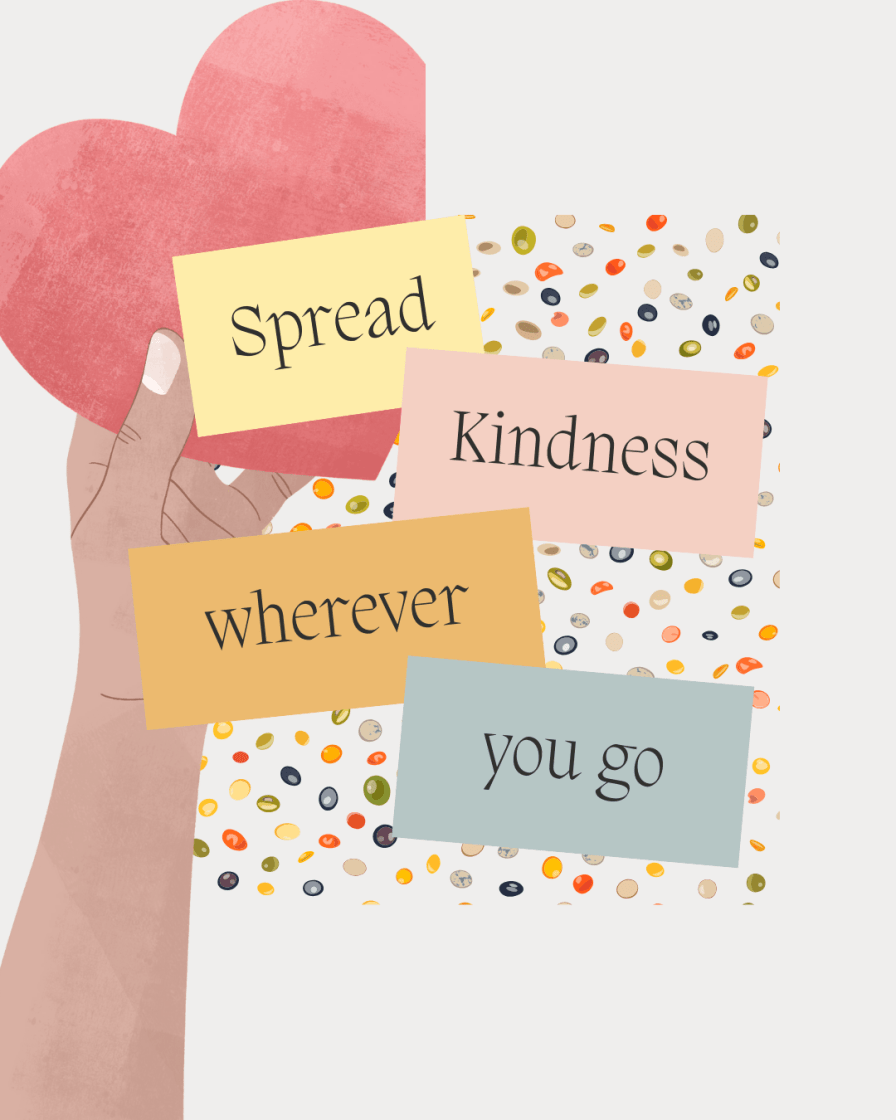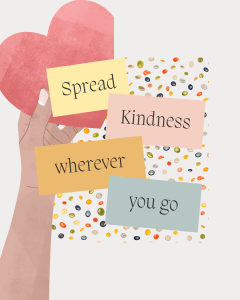
by Kayla Myers, Peer Support Coordinator
August 19, 2025
As we navigate the challenges of today's world, from political tensions to economic struggles, it’s easy to forget that the most essential part of our humanity is a simple act of kindness. On Be Kind to Humankind Week, we are gifted an opportunity not only to reflect on the value of kindness but to practice and advocate for it in our everyday lives consistently. As someone who wears multiple hats, from a peer supporter role to an advocate for social change, this week holds deeper significance.
In the role of a peer supporter, I have witnessed the ripple effect of kindness. Whether I was helping a family navigate a mental health crisis, providing emotional support to a caregiver, or simply lending a listening ear to someone in need, the power of kindness is undeniable. It’s in the small gestures. A comforting word, a shared cup of coffee, a reassuring message can make all the difference. For human beings who are fighting silent battles or going through the toughest times, these moments of human connection can be a lifeline.
However, the real challenge we face is extending that kindness beyond our immediate circles, especially in times when it feels like the world is divided. Right now, as a country, we are experiencing deep social and political division, an ongoing public health crisis, and economic instability. We are struggling to keep our heads above water, and many are feeling the weight of uncertainty and fear.
In my eyes, this is precisely the time when kindness is most needed.
 As an advocate for mental health and social change, I often find myself pushing for policy shifts and societal reforms that prioritize the well-being of all people. But advocacy doesn’t stop in the halls of government or on social media platforms. It starts with each of us, in our homes, neighborhoods, and communities. The most significant change often begins with small, personal acts of kindness.
As an advocate for mental health and social change, I often find myself pushing for policy shifts and societal reforms that prioritize the well-being of all people. But advocacy doesn’t stop in the halls of government or on social media platforms. It starts with each of us, in our homes, neighborhoods, and communities. The most significant change often begins with small, personal acts of kindness.
We are seeing what can feel like an overwhelming number of issues in the world right now: injustices, scrutiny for speaking out about the wrong that is being done daily, the rise of mental health struggles, and more. But I can only hope, in these moments of chaos, that kindness can act as a beacon of hope, a reminder that there is good in the world despite the noise. With life experience and with my work as a peer supporter, I’ve seen how simple acts can spark real, tangible change.
Kindness isn’t just about being nice; it’s about advocating for justice, lifting others up, and standing together in the face of adversity. It’s about showing up for the people who need us most. And right now, as a country, we need each other more than ever.
What can be done? What can you do? How do you get started? I am so glad you asked! Here is a simple list of ideas that I hope will help spark something within you so you can keep implementing small acts of kindness every day:
- Listen Without Judgment
Sometimes, the most powerful form of advocacy is simply being a compassionate listener. When we listen to each other’s stories without judgment or preconceived notions, we validate people’s experiences. Listening is the first step in offering support and understanding. - Support Mental Health Initiatives
Mental health is at the forefront of our collective struggles today. As a peer supporter, I know the importance of advocating for more accessible, equitable, and compassionate mental health services. Kindness means standing with those who need help and fighting for resources that can change their lives. - Create Safe Spaces for Dialogue
In a divided world, we need spaces where people can discuss their differences with respect and empathy. Organizing community discussions or engaging in open dialogues about current events can foster understanding, dissolve fears, and build bridges where walls once stood. - Leading with Empathy in Policy
Whether advocating for healthcare, education, or economic support, it's critical to approach these issues with empathy. Policies that impact human beings should be crafted with a deep understanding of the diverse challenges people face. A kinder, more equitable society requires us to work from a place of care and compassion, not just statistics and numbers. - Model the Change You Want to See
One of the most powerful ways we can spread kindness is by modeling it in our own actions. Whether it's in our families, at work, or in our communities, showing kindness in the way we interact with others sets the tone for those around us. Kindness is contagious. The more we practice it, the more it will spread.
We are all living through trying times, but these times do not define us. What will define us is how we respond. As individuals and as a collective society, we can choose kindness, not just on Be Kind to Humankind week, but every day. Kindness in the face of adversity can heal wounds, build communities, and drive us toward a more just and compassionate world.
As someone who has walked alongside my peers in their most vulnerable moments, I can attest to the transformative power of kindness. It is the glue that holds us together when everything else feels like it's falling apart. And if there’s one thing I know, it’s that we are all capable of spreading kindness in ways that create lasting change.
So, this Be Kind to Humankind week, I encourage you to reach out. Reach out to a neighbor, a friend, a stranger, or a family member. Let them know they’re seen, heard, and valued. Advocate for policies that prioritize the well-being of ALL people. And, perhaps most importantly, remember that kindness doesn’t just change the world, it heals it.
Kindness is not just a gesture, it’s a movement. As a peer supporter, as an advocate, and as a human being, I believe in the power of kindness to heal, unite, and empower us to create a better tomorrow. Let's make this Be Kind to Humankind week the start of something bigger. Let's make it a reminder that, no matter how dark the world may seem, kindness will always be the light that guides us home.
(Edited and enhanced using ChatGPT)